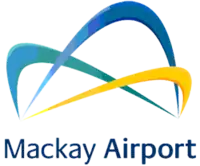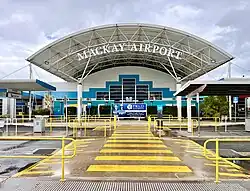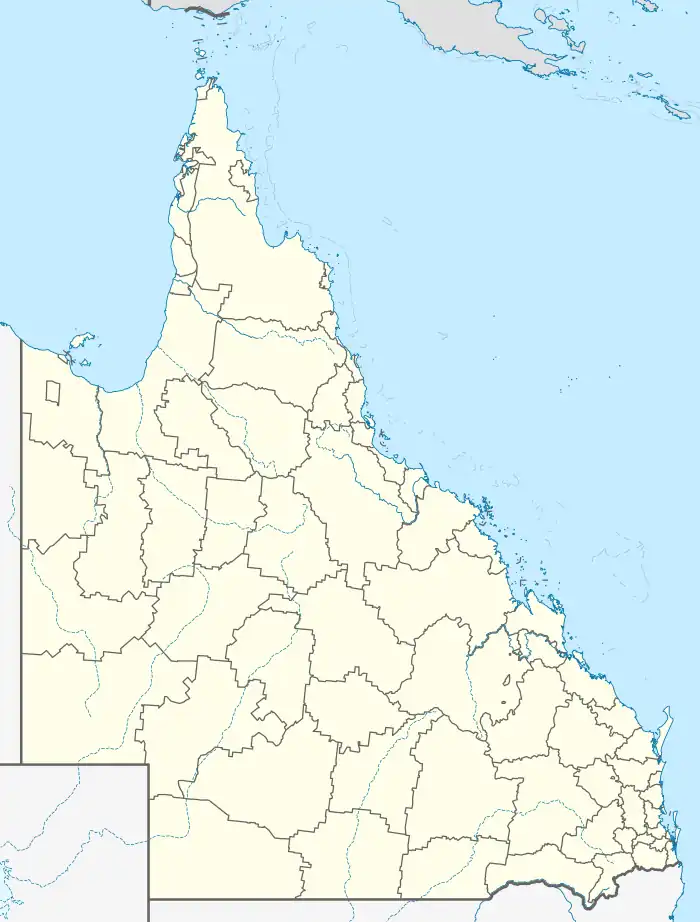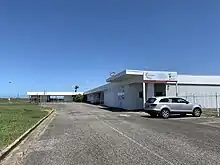Mackay Airport | |||||||||||
|---|---|---|---|---|---|---|---|---|---|---|---|
 Mackay Airport Departures | |||||||||||
 | |||||||||||
| Summary | |||||||||||
| Airport type | Public | ||||||||||
| Operator | Mackay Airport Pty Ltd | ||||||||||
| Location | Mackay, Queensland | ||||||||||
| Elevation AMSL | 19 ft / 6 m | ||||||||||
| Coordinates | 21°10′15″S 149°10′57″E / 21.17083°S 149.18250°E | ||||||||||
| Website | www.mackayairport.com.au | ||||||||||
| Map | |||||||||||
 YBMK Location in Queensland | |||||||||||
| Runways | |||||||||||
| |||||||||||
| Statistics (2010–11[1]) | |||||||||||
| |||||||||||
Mackay Airport (IATA: MKY, ICAO: YBMK) located in South Mackay, Queensland, Australia is a major Australian regional airport that services the city of Mackay, with flights to the cities of Brisbane, Rockhampton, Townsville, Hamilton Island, Cairns, Sunshine Coast and Melbourne . In the year ending 30 June 2012,[1] the airport handled 969,900 passengers making it the 14th busiest airport in Australia.[3]
The airport attracts a diverse range of carriers to service the travel needs of the business, commercial, industrial, leisure and visiting friends and relatives sectors.
Mackay is a thriving mining, agricultural, industrial and regional business centre that also supports a growing tourism industry and is a gateway to the Whitsunday coast and islands.
History
Moves to establish an airport at Mackay began in 1927, when Captain Ron Adair selected the site of the town commons for the construction of an aerodrome, and landed the first plane in Mackay there, his own Avro biplane. The Mackay City Council agreed in February 1930 to apply to excise land from the commons for aviation purposes, and in April 1930 the Mackay Aerodrome was officially opened by the mayor Ian Wood.[4] The controller of civil aviation in Australia issued an airport licence on 9 March 1931.
In 1938, the airport held an airshow featuring ten aircraft, which attracted over 8,000 spectators.
Mackay Airport had grass landing strips until 1940, when the Commonwealth Government extended the airport's boundaries and upgraded the runways to unsealed gravel for use during World War II. Until 1945, Mackay Airport served as an important operational military base due to its proximity to the South West Pacific Area. In 1948, the main runway was extended, and in 1958 it was further upgraded, sealed and strengthened.
In 1941, the Commonwealth Government took control of the airport from the Mackay City Council, and built a new passenger terminal in 1953. The old terminal is still in use today, with a flight school operating out of one of its tenancies, offering a variety of pilot training programs in addition to more advanced flying qualifications. In 1984, the government offered control of the airport back to the council, which refused. It then offered the airport to the Mackay Port Authority, then changed its mind and announced the airport would be run by the Federal Airports Corporation. This move prompted an angry local reaction in Mackay, which eventually led to the port authority gaining control of the airport.
Present

Mackay Airport is used by most major airlines operating in Australia: Qantas subsidiaries QantasLink and Jetstar and Virgin Australia.
Despite the collapse of airlines Ansett Australia and Flight West Airlines in 2001, Mackay Airport experienced considerable growth in subsequent years, due to the use of the airport by Virgin Australia and the expansion of QantasLink services.
In November 2008, Mackay Airport was sold to a private consortium to fund the development of Mackay Hospital.[5]
In the year 2008,[1] the airport handled 837,416 passengers making it the 15th busiest airport in Australia.[3]
In January 2010, Auckland International Airport Limited, announced plans to purchase almost 25 per cent of North Queensland Airports (NQA), operator of the airports at Cairns and Mackay, for about $167 million. Synergies for Auckland Airport with North Queensland Airports include better management of the airports' operations and working more closely with each other to attract airlines that currently don't fly to either. NQA stands to be a good stand-alone investment for future economic growth for the state of Queensland, as international tourism for the area of Northern Queensland increases, thus, illustrating a significant increase in demand for future international flights to the airports.
In September 2015, Tigerair Australia announced it was suspending the Mackay-Melbourne service[6] due to decline in passenger numbers.
Jetstar operated a Mackay-Gold Coast route from June 2014 until September, 2015. It was also suspended due to a small number of passengers.[7]
In March, 2016 Regional Air began regular charter flights between Mackay and Hamilton Island, however Regional Air have now ceased operations.
In 2016, the cross runway 05/23 (1,344 m x 30 m)[8] was closed and partially converted into a taxiway[9] due to prohibitive lighting and pavement maintenance costs.[10]
In July 2021, local flight training organisation, Horizon Airways, was acquired by local investors and expanded substantially. Horizon Airways has expanded to a fleet of 9 aircraft, and provides regular charter flights to various local locations, particularly Keswick and Hamilton Islands.
In February 2022, Bonza announced that the airport would become one of its 17 destinations with the airline planning to fly to the Sunshine Coast, Melbourne and Cairns from Mackay [11]
Airlines and destinations
Passenger
| Airlines | Destinations |
|---|---|
| Bonza | Gold Coast,[12] Melbourne,[13] Sunshine Coast[14] |
| Jetstar | Brisbane |
| Qantas | Brisbane |
| QantasLink | Brisbane, Cairns, Rockhampton, Townsville |
| Virgin Australia | Brisbane |
Cargo
| Airlines | Destinations |
|---|---|
| Pel-Air | Brisbane |
| Toll Aviation | Brisbane, Mount Isa |
Statistics
Operations
| Rank | Airport | Passengers carried | % change | Airline carriers |
|---|---|---|---|---|
| 1 | 565,000 | 16.8 | Jetstar, Qantas, QantasLink,
Virgin Australia | |
| 2 | no data yet | no data yet | QantasLink | |
| 2 | no data yet | no data yet | QantasLink | |
| 2 | no data yet | no data yet | QantasLink |
See also
References
- 1 2 3 4 Fiscal year 1 July – 30 June
- ↑ YBMK – Mackay (PDF). AIP En Route Supplement from Airservices Australia, effective 2023-11-30, Aeronautical Chart Archived 10 April 2012 at the Wayback Machine
- 1 2 3 "Airport Traffic Data 1985–86 to 2010–11". Bureau of Infrastructure & Transport Research Economics. May 2012. Archived from the original on 24 March 2012. Retrieved 8 May 2012. Refers to "Regular Public Transport (RPT) operations only"
- ↑ "Mackay Aerodrome". Daily Mercury. Mackay. 26 April 1930.
- ↑ "Treasurer announces successful sale of Mackay airport". Retrieved 29 January 2017.
- ↑ "Tigerair to end Mackay – Melbourne Service - Mackay Airport". www.mackayairport.com.au. Archived from the original on 28 February 2017. Retrieved 17 September 2016.
- ↑ "Jetstar to end Mackay – Gold Coast Service - Mackay Airport". www.mackayairport.com.au. Archived from the original on 28 February 2017. Retrieved 17 September 2016.
- ↑ "Final report on the audit of critical transport and power infrastructure in northern Australia" (PDF). Infrastructure Australia. Retrieved 26 September 2022.
- ↑ "Mackay Airport Aerodrome Manual" (PDF). Mackay Airport. 26 February 2021. Retrieved 26 September 2022.
- ↑ "Cross runway closure could hurt tourism, light aviators". Courier Mail. Retrieved 26 September 2022.
- ↑ "Bonza Announces New Destinations". Bay939Radio. Bay939. 15 February 2022. Retrieved 16 February 2022.
- ↑ "Bonza Launches Gold Coast Base in Nov 2023". Aeroroutes. Retrieved 8 August 2023.
- ↑ "Bonza April/May 2023 Melbourne Network Additions". Aeroroutes. Retrieved 24 March 2023.
- ↑ "Bonza Outlines Operational Network in 1H23". Aeroroutes. Retrieved 27 January 2023.